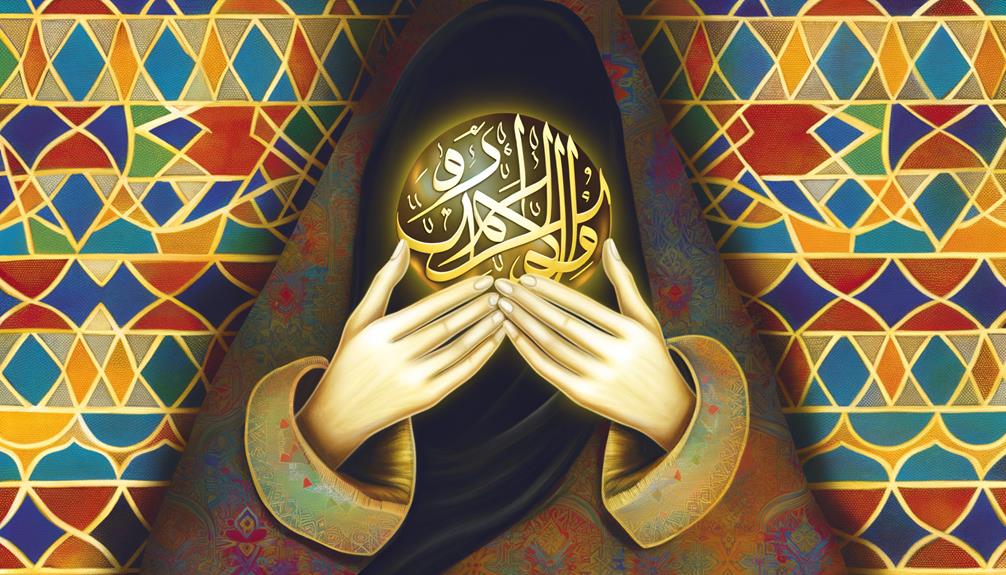Given Name Meaning in Arabic
Arabic given names are more than just labels; they're immersive narratives, rich with cultural heritage, religious importance, and often, a sense of predestiny. They're constructs of personal uniqueness, lineage, and societal ties.
The name 'Amal', for example, carries beautiful meanings of hope and aspiration. Many, like 'Abdullah', exemplify Islamic principles.
Others like 'Rasha', echo nature's beauty and resilience. Each Arabic name has a tale to tell, a virtue to uphold.
It's an enlightening exploration into the identity, culture, and perhaps, a glimpse into what shapes and inspires an individual in their life's journey. So why not explore further into this linguistic treasury?

Key Takeaways
- Arabic given names often carry profound meanings, reflecting virtues, aspirations, or natural elements.
- The meaning of a given Arabic name can reveal cultural context, personal traits, or connection to nature.
- Some common Arabic given names include 'Fatima' meaning 'one who abstains', and 'Ahmed' meaning 'highly praised'.
- Islamic influence is significant, with given names like 'Abdullah' embodying central beliefs of Islam, and 'Muhammad' being a prevalent choice.
- Understanding the meaning of Arabic given names provides insight into Arabic culture, heritage, and religious beliefs.
The Significance of Arabic Names
Why are Arabic names significant, you might wonder? They bear a profound cultural and linguistic richness, often encapsulating stories, virtues, or aspirations in a single word.
For instance, 'Amal' (أمل) isn't just a name; it also means 'hope'. It's not just about phonetics and how the name sounds, but also the deep-rooted meaning it holds.
Arabic names also serve as a means of preserving heritage and identity; they're a form of communication, transferring cultural and religious values across generations. They're also linked with certain beliefs, such as the idea that a name can shape a person's character or destiny.
Structure and Components of Arabic Names
Diving into the structure and components of Arabic names, you'll find that it's a layered and intricate system, often comprising of a personal name, followed by the father's name, and then the paternal grandfather's name, each imbued with unique significance and meaning. This system, known as 'Ism', 'Nasab', and 'Nisba', reflects a person's identity, lineage, and affiliation respectively.
To illustrate, consider this table:
| Arabic | Transliteration | Meaning |
|---|---|---|
| Ism | Personal Name | Reflects individuality |
| Nasab | Father's Name | Signifies lineage |
| Nisba | Grandfather's Name | Indicates affiliation |
To fully comprehend this, think of it as a narrative of one's existence, where each component is a chapter detailing individuality, roots, and societal ties. Understanding this structure will give you greater insight into Arabic naming customs.
The Role of Religion in Arabic Names
You'll find that religion, particularly Islam, plays a pivotal role in Arabic naming customs. It's not just about linguistic preferences; it's also an expression of faith and spiritual identity.
Let's explore how religious tenets shape these traditions and the profound meanings embedded in Islamic names.
Influence of Islam
In the domain of Arabic nomenclature, the profound influence of Islam is undeniably apparent, shaping the meanings and significance of given names in this richly diverse linguistic and cultural landscape.
You'll frequently find names that reflect Islamic theology, principles, history, and figures.
- *Theology*: Many names, like 'Abdullah' (Servant of God), embody central beliefs of Islam.
- *Principles*: Names like 'Sadiq' (Truthful) or 'Adil' (Just) represent Islamic ideals.
- *History*: Names such as 'Fatima' and 'Ali' honor significant historical personalities in Islam.
- *Figures*: 'Muhammad', the Prophet's name, is a prevalent choice among Muslims.
Understanding these influences can enrich your grasp of Arabic names and the cultural and religious layers they carry. It's a reflection of Islam's role in shaping Arabic identity and expression.
Religious Arabic Naming Customs
Moving beyond the influence of Islam on the meanings of Arabic names, let's explore how religious customs dictate the process of naming in Arabic culture. It's common to name children after significant religious figures, events, or attributes. This tradition, deeply ingrained in Arabic culture, serves to invoke blessings upon the child and instill a strong religious identity.
Here's a brief table to provide a glimpse of this practice:
| Arabic Name | Derived From |
|---|---|
| Mohammed | Prophet Mohammed |
| Fatima | Prophet Mohammed's Daughter |
| Ali | Fourth Caliph of Islam |
| Maryam | Mother of Jesus in Islam |
Common Arabic Names and Their Meanings
Delving into the treasure trove of Arabic names, one can't help but appreciate their profound meanings and cultural significance. You'll find that many names aren't just labels, but also carry virtues, aspirations, and spiritual connotations.
Here are four common Arabic names with their meanings:
- *Fatima* (فاطمة): This name is highly popular due to its religious significance. It means 'one who abstains' or 'one who weans'.
- *Ahmed* (أحمد): A widely-used name, Ahmed signifies 'the one who's highly praised'.
- *Layla* (ليلى): A beautiful name for girls, Layla translates to 'night' or 'dark beauty'.
- *Omar* (عمر): A traditional name, Omar conveys 'long-lived' or 'flourishing'.
Understanding these names can provide insights into Arabic culture and values.
Arabic Names Inspired by Nature
Arabic culture's profound connection with nature is also reflected in the names they choose, offering another layer of understanding to their rich linguistic heritage.
You'll find Arabic names like Rasha (رشا) meaning 'gazelle' and Nisreen (نسرين), which translates to 'wild rose'.
Male names, too, reflect this nature-centric approach. For example, the name Jabr (جبر) means 'comfort' and is often linked with the comforting presence of a tree.
Studying these names, you notice how the Arab world's reverence for nature has influenced their naming practices.
It's not just about assigning a name, it's about imbuing a connection to the natural world.
The Influence of Arabic Names Globally
You've likely noticed the broad adoption of Arabic names worldwide, a significant occurrence to explore.
This global spread not only signifies the appeal of Arabic names but also their impact on cultural identity across borders.
As we proceed, you'll learn about the factors behind this phenomenon and its far-reaching implications.
Arabic Names Worldwide Adoption
Globally, it's clear to see the profound influence of Arabic names, with their rich meanings and cultural significance, being adopted by a multitude of cultures and languages. This adoption isn't merely a trend but rather reflects a deep appreciation for the Arabic linguistic heritage.
Here are some key areas where this adoption is noticeable:
- Famous personalities, such as athletes and celebrities, choosing Arabic names for their children.
- Arabic names being used in literature and movies, enhancing their global prominence.
- Introduction of Arabic names in non-Arabic speaking countries via immigration.
- Adoption of Arabic names by converts to Islam, contributing to their worldwide proliferation.
You're witnessing a unique cultural exchange, as Arabic names become integrated into the fabric of diverse societies.
Impact on Cultural Identity
Reflecting on the wide adoption of these names, it's fascinating to explore how this global impact of Arabic names shapes cultural identity in various societies. As you explore the profound meanings behind Arabic names, you discover that each one carries a narrative, a legacy, and a cultural significance, portraying a vibrant image of the Arab world's rich history and values.
To exemplify, let's consider the following instances:
| Arabic Name | Meaning |
|---|---|
| Ahmad | Highly commendable |
| Fatima | One who nurtures |
| Zainab | Source of father's pride |
| Omar | Thriving, enduring |
| Yasmin | Fragrant Jasmine bloom |
These names, among others, are not just mere designations, but they embody the values, aspirations, and social standards of the Arabic-speaking community, solidifying the cultural identity of individuals who carry them, irrespective of their location.
Conclusion
You've journeyed through the rich tapestry of Arabic names, marvelling at their depth and religious significance.
It's fascinating to ponder that over 60% of Arabic names are inspired by virtues, nature, or divine attributes. This beautifully reflects the deep connection between language, culture, and faith.
As you encounter Arabic names, remember, they're more than simple tags; they're vibrant expressions of identity, hope, and aspiration.






